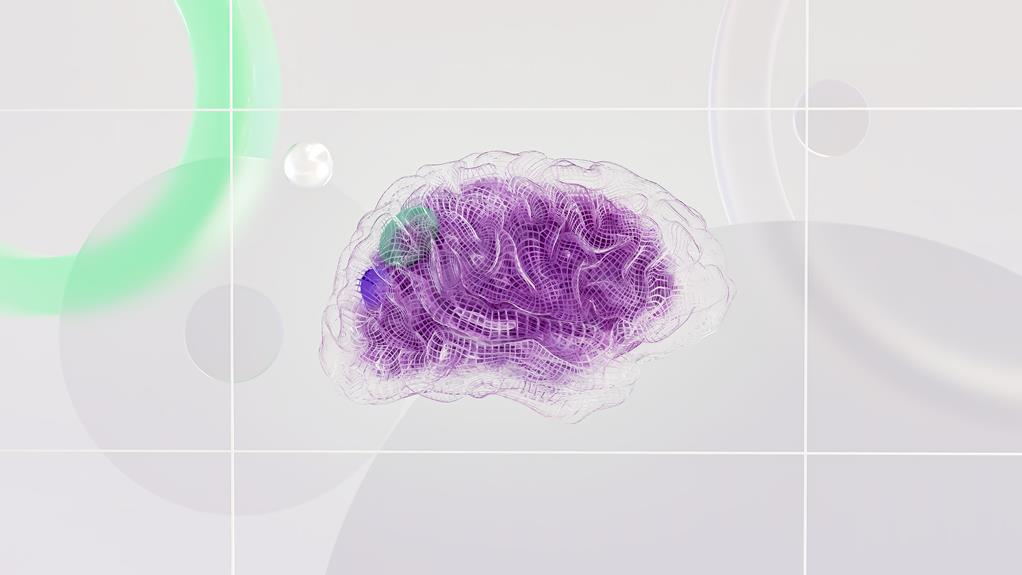Do UFC fighters face the risk of brain damage?
This pressing question has garnered significant attention in recent years, as extensive research delves into the impact of head trauma sustained during fights. With studies revealing a high prevalence of brain damage among these athletes, including traumatic brain injuries and concussions, it becomes imperative to explore the available research to gain a comprehensive understanding of this issue.
In this article, we will embark on a journey through the depths of research, examining the prevalence, cognitive implications, preventive measures, and the UFC's efforts in addressing fighter brain health.
Key Takeaways
- Medical research suggests that UFC fighters are at risk of developing brain damage due to head trauma from impacts to the head.
- A significant percentage of MMA fighters, around 23.6%, suffer from some form of brain damage.
- The prevalence of traumatic brain injuries or concussion-like injuries in MMA fights is around 32%.
- Between 58% to 78% of all MMA injuries are related to head trauma, indicating the high risk involved in the sport.
Prevalence and Impact of Brain Damage
Brain damage is a significant concern in the UFC, as research indicates a high prevalence and impactful consequences for fighters.
Studies have shown that brain damage is caused by head trauma resulting from impacts to the head during fights. In fact, medical research suggests that 23.6% of MMA fighters suffer some form of brain damage. Additionally, traumatic brain injuries or concussion-like injuries occur in 32% of fights, and between 58% to 78% of all MMA injuries are head trauma related.
Cognitive impairment tests have revealed worse scores for fighters with head trauma, and the thalamus and caudate are the most affected parts of their brains.
It is important to note that the long-term consequences of brain damage in UFC fighters are still being studied, and future research is needed to fully understand the extent of these effects.
Cognitive Impairment and Brain Regions Affected
The prevalence of brain damage in UFC fighters has been linked to cognitive impairment and affects specific regions of the fighters' brains. Long-term consequences of brain damage in UFC fighters can lead to the development of neurodegenerative diseases such as chronic traumatic encephalopathy (CTE).
Cognitive impairment testing methods play a crucial role in assessing the extent of brain damage and its impact on fighters' cognitive function. Reliable testing methods include neurocognitive assessments, neuropsychological tests, and brain imaging techniques like MRI and CT scans. These tests provide valuable insights into the cognitive deficits experienced by UFC fighters and help in monitoring the progression of their brain damage over time.
Understanding the specific brain regions affected by brain damage is essential for targeted interventions and treatments to mitigate the cognitive impairments and improve the overall brain health of UFC fighters.
Factors Affecting Likelihood of Brain Damage
Factors influencing the likelihood of brain damage in UFC fighters can be attributed to various elements. These include career length, fight frequency, and genetic factors. Long-term effects of subconcussive head trauma, which refers to repetitive impacts to the head that do not result in a concussion, are a significant concern for fighters. Research has shown that the duration of a fighter's career plays a role in the development of brain damage. Fighters with shorter careers and less frequent fights are less likely to experience brain damage.
Additionally, genetic factors may contribute to an individual's susceptibility to brain damage. Understanding these factors is crucial for implementing preventive measures and ensuring the long-term brain health of UFC fighters. Further research is needed to fully comprehend the impact of these factors and develop effective strategies for brain damage prevention in the sport.
Immediate Effects of Knockouts and Subconcussive Head Trauma
What are the immediate effects of knockouts and subconcussive head trauma on UFC fighters?
- Immediate brain tissue loss: Knockouts in UFC fights result in a significant loss of brain tissue. The forceful impact to the head causes immediate damage, leading to the destruction of brain cells and tissue.
- Cumulative damage: While subconcussive head trauma may not have the same immediate severity as knockouts, it can still cause cumulative damage over time. These repeated blows to the head, even if they don't result in a knockout, can lead to long-term brain damage and increase the risk of neurodegenerative diseases like chronic traumatic encephalopathy (CTE).
- Importance of early detection: Early detection of brain damage is crucial in mitigating its long-term effects. By identifying and monitoring the immediate effects of knockouts and subconcussive head trauma, medical professionals can intervene early and implement necessary treatment and preventive measures to minimize further damage and improve the overall brain health of UFC fighters.
Understanding the immediate effects of knockouts and subconcussive head trauma highlights the urgency of early detection and emphasizes the need for proactive measures to protect the long-term brain health of UFC fighters.
Examples of UFC Fighters With Brain Damage
Several UFC fighters have experienced brain damage as a result of their participation in the sport. One notable example is Spencer Fisher, who retired in 2013 due to the long-term effects of brain trauma. Fisher had a total of 22 fights in the UFC and has since been diagnosed with CTE (chronic traumatic encephalopathy), a degenerative brain disease associated with repetitive head trauma.
Another tragic case is that of Tim Hague, a former UFC heavyweight fighter who passed away in 2017 after suffering a knockout loss in a boxing match. Hague's death was attributed to a brain hemorrhage caused by the traumatic brain injury he sustained in the fight.
These examples highlight the serious consequences of brain damage in UFC fighters and underscore the importance of implementing preventive measures to protect their long-term brain health.
Preventive Measures for UFC Fighter Brain Damage
To mitigate the risk of brain damage in UFC fighters, it is imperative to implement preventive measures that prioritize their long-term brain health. Here are three crucial measures that can be taken:
- Increased medical supervision: UFC fighters should have enhanced medical supervision during and after their careers. This includes regular visits to doctors and increased monitoring of their brain health. Medical professionals should be well-versed in recognizing the signs of brain damage and be able to provide appropriate care and guidance.
- Mandatory brain scans: Fighters should undergo mandatory MRI and CT scans to detect any signs of brain damage or brain bleeds. These scans can help identify potential issues early on and allow for timely intervention and treatment.
- Use of infrascanners: Infrascanners, a portable imaging device, can be utilized at events to detect brain bleeds and injuries immediately. This early detection can prevent further damage and allow for prompt medical attention.
Comparison With Other Contact Sports and Ufc's Efforts
The comparison between brain damage in UFC fighters and athletes in other contact sports reveals similar patterns of injury and raises questions about the effectiveness of UFC's efforts to address fighter brain health. While UFC has made initiatives for brain safety, such as increased medical supervision and investment in fighter brain safety, the prevalence of brain damage in UFC fighters is still a concern. To provide a comprehensive view, let's compare brain damage in UFC with other contact sports in the following table:
| Sport | Prevalence of Brain Damage | Efforts for Brain Safety |
|---|---|---|
| UFC | High | Increased medical supervision, investment, education |
| Boxing | High | Concussion awareness training for coaches, regulations |
| Football | High | Rule changes, helmet improvements, ongoing research |
| Hockey | Moderate | Rule changes, helmet improvements, ongoing research |
| Rugby | Moderate | Rule changes, concussion protocols, ongoing research |
In comparison to other contact sports, UFC's efforts for brain safety are commendable, but more can be done to protect fighters from brain damage. The high prevalence of brain damage in UFC fighters calls for further research, prevention measures, and regulatory changes to ensure fighter safety.
Frequently Asked Questions
How Does Brain Damage in UFC Fighters Compare to Brain Damage in Other Combat Sports?
Brain damage in UFC fighters, resulting from repetitive head trauma, is comparable to that seen in other combat sports. However, studies suggest that boxers may experience more significant loss of brain volume compared to UFC and MMA fighters.
Are There Any Long-Term Effects of Subconcussive Head Trauma in UFC Fighters?
Long-term effects of subconcussive head trauma in UFC fighters include cumulative damage and increased risk of neurodegenerative diseases like CTE. Understanding and preventing these effects is crucial for fighter safety and requires continued research and implementation of protective measures.
What Are the Potential Risks Associated With "Gym Wars" in MMA Training?
The potential risks associated with 'gym wars' in MMA training include serious injuries and an increased likelihood of brain damage. However, implementing measures such as increased supervision, education, and a shift in mentality can help mitigate these risks and protect fighter safety and performance.
How Does the Prevalence of Brain Damage Differ Between UFC Fighters and Boxers?
The prevalence of brain damage differs between UFC fighters and boxers. While both groups experience brain damage, boxers tend to lose more brain volume. Repeated head trauma in UFC fighters can lead to cognitive effects and further research is needed to prevent and mitigate these risks.
Are There Any Specific Regulations or Licensing Requirements in Place to Protect the Brain Health of UFC Fighters?
In order to protect the brain health of UFC fighters, specific regulations and licensing requirements should be implemented. This includes measures such as mandatory brain scans, increased medical supervision, and education on concussions and CTE. Comparisons with other contact sports can inform these efforts.
Conclusion
In conclusion, extensive research has demonstrated the prevalence and impact of brain damage among UFC fighters. Studies have shown that a significant percentage of these athletes suffer from traumatic brain injuries and concussions, leading to cognitive impairment and affecting specific regions of the brain.
Factors such as the length of a fighter's career play a role in the likelihood of brain damage. It is crucial for the UFC to continue implementing preventive measures and addressing fighter brain health to ensure the long-term well-being of their athletes.
- 15 Best Martial Arts Weapons (Fighting & Training) - October 14, 2024
- Is Fencing a Martial Art? (Yes, 4 Reasons Why) - October 14, 2024
- 7 Best Martial Arts for Self-defense Ranked (Highly Effective) - October 14, 2024










